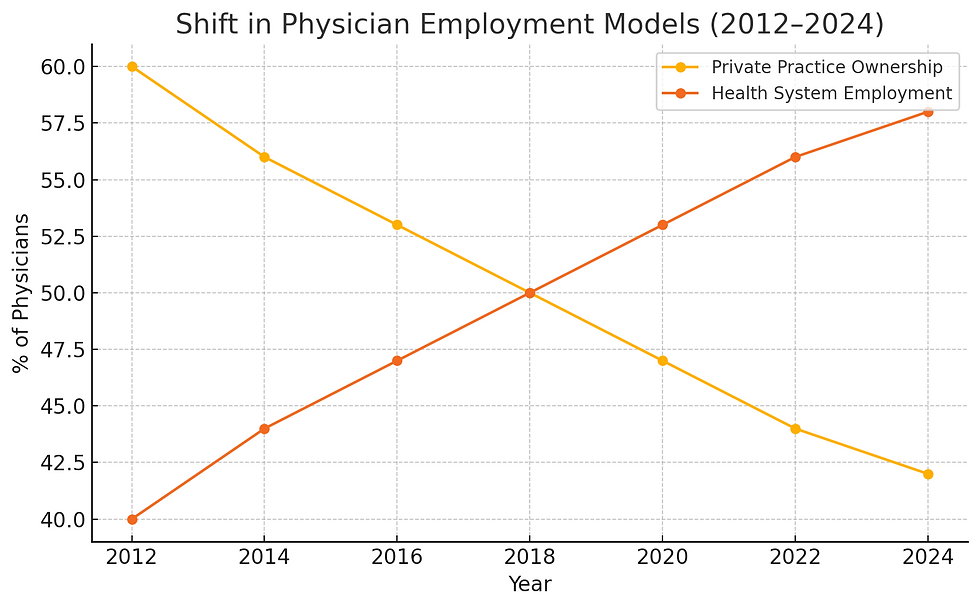Your Data Is Talking — Here’s How to Actually Listen (and Which KPIs Are Worth Hearing)
- Alex.Nedzelskiy@sloanmed

- Oct 20, 2025
- 3 min read
Let’s be honest — most practices are sitting on a mountain of data they don’t really understand. Reports get pulled, numbers get color-coded, everyone nods through a “monthly KPI meeting,” and then… nothing actually changes.

If that sounds familiar, you’re not alone. But here’s the truth: your data is constantly telling you what’s wrong with your revenue cycle — you just have to stop treating it like background noise.
The Dashboard Isn’t the Data
There’s a big difference between having reports and using reports. Just because you can click into a dashboard doesn’t mean you’re interpreting what it’s saying.
A clean spreadsheet full of percentages looks productive — until you realize those numbers haven’t driven a single process change in six months. If your team is “reporting” for the sake of looking organized, you’re burning time on vanity.
If your meeting ends with “everything looks about the same,” your data is collecting dust.
Vanity Metrics vs. Actionable Metrics
Not all KPIs are created equal. Some make you feel good; others make you better.
Vanity metrics are the shiny ones — total claims submitted, gross charges, number of patient statements sent. They show activity, not performance.
Actionable metrics are the ones that actually move money — net collection rate, first-pass denial rate, AR days by payer, payment turnaround time.
Vanity metrics tell you how busy you are. Actionable metrics tell you whether your busyness is profitable.
When you track the wrong data, you end up managing output, not outcomes — and that’s how practices lose control of their revenue cycle without even realizing it.
What Your KPIs Are Really Saying
Let’s decode a few of the loudest messages your data might be trying to send:
High first-pass denial rate: Your front-end process is leaking — eligibility errors, missing prior auths, sloppy coding, or inconsistent scrubbing.
Rising AR over 90 days: Follow-ups aren’t happening fast enough, or your team is stuck reacting instead of prioritizing.
Low net collection rate: You’re leaving money on the table through underpayments or claims that die quietly in appeals purgatory.
Consistent volume but flat revenue: You’re posting charges, but not optimizing reimbursements. Someone’s focusing on speed over accuracy.
Every metric is a pulse check — if it’s off, it’s telling you exactly where to look.
Building a Routine That Actually Means Something
Most practices drown in reports because they try to track everything. Don’t. Track what matters, consistently, and talk about it like it matters.
Start simple:
Pick four KPIs that directly reflect your revenue health. Net collection rate, days in AR, first pass resolution rate & percentage of AR over 90 days.
Assign ownership — someone who’s responsible for monitoring and explaining each one.
Review them monthly — trends, not snapshots.
End every meeting with one clear action item.
Your reports shouldn’t be a slideshow — they should be a map.
Stop Measuring to Prove — Start Measuring to Improve
Here’s a hard truth: most practices run reports to prove they’re working hard, not to improve how they work. That mindset has to go.
It’s not about making the numbers look good for the doctor, the owner, or the board. It’s about finding the friction — the part of your workflow that keeps stealing time and money — and fixing it.
Data is only valuable when it makes you uncomfortable enough to change something.
The Quiet Power of Consistency
The practices that perform the best financially aren’t the ones with the fanciest dashboards or the loudest tech stacks. They’re the ones that meet consistently, measure honestly, and actually act on what they see.
Your data already has all the answers. The question is — are you listening, or are you waiting for another “month-end report” to tell you what you already know?
Final Thought
You don’t need more reports. You need better conversations about the ones you already have.
Once your team starts treating KPIs like clues instead of homework, you’ll see the difference — not just in collections, but in accountability, communication, and how confidently your staff can say, “we know exactly where we stand.”





Comments